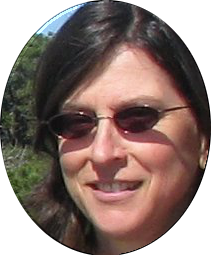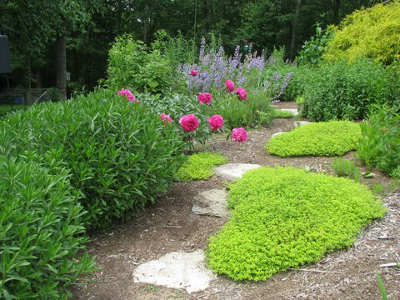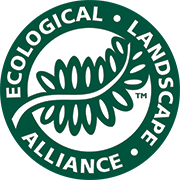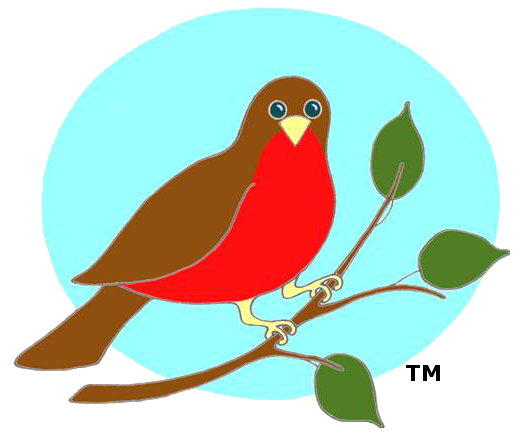



|
Robin in the Garden is a landscaping company specializing in organic land care with an emphasis on native and low maintenance plants in garden installations. We've specialized in organic landcare since 2010. We stress building healthy soil and matching plants to a client’s unique soil and shade conditions to encourage healthy plants. |
Robin in the Garden is a sole proprietorship run by Robin Franklin. A biologist with a Master’s Degree in Land Resources, she has been certified in Organic Land Care by the New England Farming Association (NOFA) since 2008 and a certified Connecticut Master Gardener since 2010. |
Licensed & Insured
|

Certified Organic Land Care ProfessionalMission Statement:Robin in the Garden promotes the use of healthy, organic methods of lawn and garden care for clients and for public spaces in the community.We think holistically of the client’s land as an ecosystem. A healthy ecosystem is self-sustaining, and a healthy yard provides more pleasure with less work. It also provides places for native birds, pollinators and animals to live. |
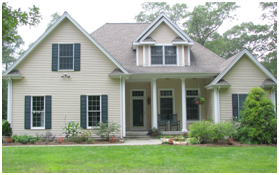
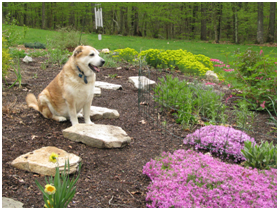
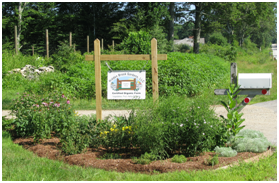
|
HELPFUL ORGANIZATIONSAudubon Society: www.audubonCT.org/Connecticut Botanical Society: www.Ct-botanical-society.org Ecological Landscape Alliance: www.ecolandscaping.org National Gardening Association: www.garden.org Native Plant Trust: www.nativeplanttrust.org Northeast Organic Farming Assn.: www.nofa.org University of Connecticut Extension Service: www.ladybug.uconn.edu USEPA: https://archive.epa.gov/greenacres/web/html/index.html Wild Ones: wildones.org/chapters-2 |
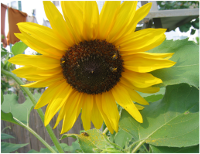 |
INFORMATION ON SUSTAINABLE AND ORGANIC LAWNS AND GARDENS
Harvard's highly successful on-campus organic land care program (Click here for more information.)EPA brochure about 'Greenscaping', environmentally healthy landscaping and yard care (Click here for more information.)
EPA info about composting, sustainable landscaping, etc. (Click here for more information.)
EPA brochure about the environmental costs of current lawn practices and the benefits of sustainable landscaping practices, including reducing lawn size, gardening with native plants and reducing or eliminating synthetic fertilizers and pesticides (Click here for more information.)
Many links and resources concerning sustainable landscaping from the Audubon Society (Click here for more information.)
University of Connecticut Extension Service has lots of information about gardening with native plants as well as soil testing information (Click here for more information.)
Ecological Landscape Alliance (Click here for more information.)
VEGETABLE GARDENING
Lots of links to good organic gardening information from the Connecticut branch of NOFA (Click here for more information.)National Gardening Association has a very complete pest library with good weed and insect pictures. Also important, pictures of beneficial insects! Its good to keep them in the garden! (Click here for more information.)
National Gardening Association vegetable gardening guidance (Click here for more information.)
University of Connecticut Extension Service has lots of information about vegetable gardening as well as soil testing information (Click here for more information.)
HEALTHY SOILS
U Conn Soil testing information (Click here for more information.)U Mass Soil testing information (Click here for more information.)
WEED IDENTIFICATION AND CONTROL
National Gardening Association Weed Library Click here for more information.)BENEFICIAL INSECTS and INSECT PESTS
National Gardening Association has a very complete pest library with good weed and insect pictures. Also important, pictures of beneficial insects! Its good to keep them in the garden! (Click here for more information.)Attracting butterflies (Click here for more information.)
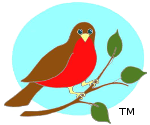

Robin in the Garden provides organic land care of clients' landscapes as well as consulting, planning and installation services for improvements in clients' yards and gardens.
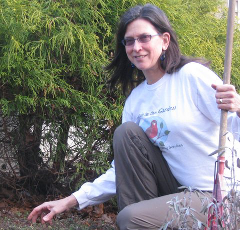 |
 Connecticut Master Gardener |
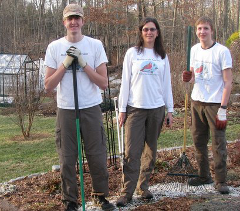
Email: grngrl@robininthegarden.com |
 WHY ORGANIC?It is very satisfying to have a beautiful yard! It can be even more satisfying if you know that it is benefitting birds, wildlife, the natural world and the quality of our drinking and swimming water.SYNTHETIC vs. NATURAL FERTILIZERSWhen we put natural fertilizers on our yards, they build up the quality of our soil and make the plants that grow on it healthier and more insect and disease resistant. We end up with a healthier environment for people, plants, and wild animals. If we use synthetic fertilizers, they often provide more nutrients than our soil and plants can readily absorb, leading to damaging run-off into our water supply. They can also damage natural beneficial organisms that are trying to build healthy soil. ORGANIC vs. SYNTHETIC PESTICIDESWith organic pest control, When we do encounter a pest problem, if we are careful to use more benign methods of control, such as physical traps, soap or oil solutions, we will see very little collateral damage.When we use synthetic pesticides, they very often can cause harm to humans and pets and kill beneficial insects that were feeding on pests https://ct.audubon.org/reduce-pesticides |
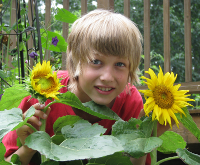 Organic land care can be simple rather than complicated or mysterious. Managing your land in a way that makes your plants healthy and happy makes them strong enough to outcompete many problem weeds and insect pests. There are many private organizations and government offices that recognize the power of organic methods and have lots of helpful information about how to do it (see our Resources tab). You can be rewarded with the sight of native bees, butterflies and birds sharing your landscape and with the knowledge that you are helping make the world a healthier place!  |
Phone: 860-710-4466
Email: grngrl@robininthegarden.com
Email: grngrl@robininthegarden.com

CONTACT INFORMATION
Robin In The GardenPhone: 860-710-4466
